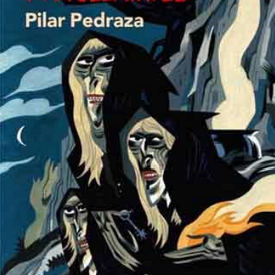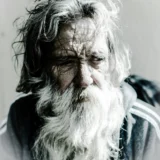This interview with Anton Marks is a cross-posting from Journey Planet, conducted by James Bacon. (April 1, 2015) and kindly brought to our attention by contributor Erin Underwood
Anton Marks is an author of genre fiction who also happens to be a Black train driver of Caribbean heritage living in London. He writes brilliant fiction, and his protagonists in his most recent supernatural thriller Bad II the Bone are three women, preternaturally gifted, racially diverse and thrown into an exciting fantastical story, yet somehow anchored in the gritty reality of London.
In a place and time where Lenny Henry, one of Britain’s finest and best known comedians utilises a guest editorship of Radio 4’s today programme to encourage and thus demonstrate the lack of ethnic diversity involvement in entertainment and media, in our corner of the world, there is a lot of lip service, but not enough action. Finding and buying a book is a huge step beyond just tweeting or sharing something you agree with. It takes longer, and needs more patience.
Making a tangible effort and difference, seeking out writers, looking in the places that we don’t normally go, especially outside one’s comfort zone is not easy, but is vastly rewarding. Large comic conventions have made it better for diversity in comics by introducing small press and self-published creators to larger audiences, but in the world of prose, there are still barriers for those outside of traditional publishing.
Despite selling millions of books, self-publishing authors do not possess the currency or gravity that is accorded to authors published by recognised publishers, even if it is just for a few titles, and afterwards the author is never seen again.
Marks is off the radar. You don’t and won’t have heard of him. I only heard of him because I am a train driving colleague.
He has sold thousands of books. His book launches happen in night clubs where guest DJs from BBC Radio 1 Extra play their groove, where suits and fine dresses are de rigeur, and where I am the only Irish person in the place. I notice if no one else does. The queue forms and he signs and sells; a quick but careful look indicates his readership representation here is predominantly female.
Although welcomed into the venue, it would be a lie to say I was not apprehensive, and smiled to myself, in the knowledge that if Anton said the same about one of my conventions, how patronizingly I would dismiss it. Harder, with the tables turned.
Yet for all these unparalleled and interesting elements, this is no gambit at a unique selling point to move more units. This is how it is, and for his readers, it makes no difference—the book and the writing must be good. It is good for me, and this is what makes me write.
There is quite the horror element to this book and the undertone of gang violence and terrorism in an urban environment can be felt in this portrayal of the fight against another darker threat. The main characters, Y, Suzy Wong and Patra, although possessing fantastical tools, feel natural and normal in London.
To avoid my passionate and jaundiced view being all you perceive, I ask Marks for an interview. He is handsome, suave and pleasant, a family man who works hard to make the time to be a writer. His passion is science fiction, and his enthusiasm for the genre permeates everything he seems to do, eyes smiling when we touch on common interests.
James: Anton, this work is darker in many respects to your previous works. You’ve been happy to identify it as a supernatural thriller. How did you come to write this story?
Anton: For years I was playing around with the idea of handling the supernatural from an everyman perspective. A concept that would span my love for genre fiction, music and strong women. The dynamic was obviously the Charlie’s Angels idea but with an urban bent that appealed to me. I knew it would be fun and it also it would give me an opportunity to shift the horror genre roots from eastern Europe to the Caribbean and Africa in a respectful way.
James: You seem to have many sources of inspiration, but apart from obviously liking genre fiction, what elements do you ascribe to your Caribbean roots and your knowledge and affinity of the ghetto lifestyle?
Anton: Being of Jamaican decent and living in London my perspectives are informed by my experiences. And as any good writer will attest, these experiences are what give our work that all important verisimilitude. My hope is that my voice will inject a fresh point of view into the genre and one that’s attractive to new adventurous readers. But also imbuing my stories with an edge they would not have had if not for my formative years in the Caribbean.
James: Your three main characters, Y, Suzy Wong and Patra. are incredibly unusual, female, ethnically diverse, very deep characters from unique backgrounds and preternaturally gifted. I think readers will recognise they are fresh. Can you describe them?
Anton: Yvonne Y Sinclair is a nail technician of Caribbean heritage from west London. She is a gifted Kendo practitioner and has a Katana given to her by her wanderlust father which is her weapon of choice. Y can imbue her Katana with her life force. She is the natural leader of their sisterhood and a born strategist. When the tough choices are to be made Y will make them.
Suzanne Suzy Wong Young is a Securicor Officer of Jamaican Chinese extraction. Her path led her to the UK because of her boyfriend who lives here. She is an exceptional Wushu fighter and an empath. Suzy hates injustice and her good intentions can get her into trouble. She is the group’s voice of reason.
Cleo Patra Jones is African American and totally free spirited. Patra left Atlanta for London because of her preacher father’s puritanical attitudes. She’s a model, exotic dancer and adrenaline junky. She has the ability to alter the laws of probability around her. Patra will tell you how it is, without concern for your feelings but it’s done because of her belief in being real. She is a natural kick boxer and has found a nonjudgemental family in the others.
James: Creating a fighting team as you describe yourself, a street level deterrent, an estrogen-fuelled blunt instrument against the human monsters and metaphysical nightmares which has a direct connection to the criminal underworld seems quite clever. What real life elements have manifested themselves in your story, and what are the wider issues that you are addressing here?
Anton: What I’ve always found strange was the lack of racial diversity in horror and supernaturally themed books, comics seemed to be way ahead of the traditional publishing world in this respect. The solution is simple to my mind – I should create it myself. In the real world crime and terror are faceless and perpetrated by all classes, colours, creeds and religions And I just felt it would be interesting to see how an esoteric threat would be handled by characters with a different sensibility from what we normally see in the usual books with a horror theme. I just find that it’s exciting I’m able to feature the mythologies from ethnic communities we never usually see in these circumstances or play around with the established ones.
James: Are there any works that you feel are capturing your imagination when it comes to genre fiction and what is it that you find captivating?
Anton: There are quite a few works actually that span the length and breadth of speculative fiction, past and present. In Epic Fantasy I’m feeling N K Jemisin – The Hundred Thousand Kingdoms, Charles Saunders – Imaro, Steve Barnes – Lion’s Blood, Patrick Rothfuss – The Name of the Wind and George RR Martin – Game of Thrones.
In Urban Paranormal/Fantasy I’m excited about Ben Aaronovitch featuring the stories of PC Peter Grant, apprentice Wizard and I’m just starting My Soul to Keep by Tananarive Due.
Mainstream horror, I was caught up with Guillermo Del Toro and Chuck Hogan – The Strain Trilogy and Justin Cronin – The Passage Trilogy. Mark Tufo’s – Zombie Fallout series is hilarious, chilling and heartwarming all at the same time.
I’ve been reading the old classics recently also Octavia Butler’s – Lilith’s Brood, Issac Asimov – Foundation Trilogy, Frank Herbert – Dune.
James: Maintaining a balance of good and evil is a theme here, indeed, one feels the characters are all about allowing regular people to live and let live. You have linked gang violence to intolerance, which of course is apt, but how do you see that in the real world?
Anton: I adore tales that intermingle actuality and make-believe. It’s just something about the feeling a reader experiences knowing the fictive character they are reading about shared history with an actual person or event or even referenced it in the telling of the story. Add that technique with a truthfulness that can make some people uncomfortable and that ‘telling detail’ is where I’m coming from with my writing. One such detail is my race. It impacts my life in one form or another in my comings and goings so I tend not to ignore its relevance in my stories. Every one of my experiences and the experiences of my characters are seen through uniquely developed filters. Whether it is sex, gang violence, mysticism or two people in love, I see that perspective as an advantage and it will bring a fresh point of view to my books. Just another reason why you want to go out and get a copy.
James: I have come to understand that you have a unique voice in genre fiction, one that is underground in actual fact, a cult following of thousands of dedicated readers, who the mainstream have missed, launch parties that are in clubs with DJs, queues for your books and no media attention. Would you mind commenting on how it is for a black genre writer in modern Britain?
Anton: I think it’s a wonderful opportunity being a black genre writer in modern Britain. If you’re a creative individual with your eyes firmly set on the new trends of branding and online marketing then it’s possible to create a buzz around your work. It’s not easy because the internet noise from other authors is deafening at times but with persistence, luck and a unique brand it’s possible. The black British perspective has been overlooked in many media and that has left an oasis of opportunity for creatives and forward thinking entertainment facilitators. But you have to be willing to give new talent, developing talent, a chance. And then back that talent, raw or developed, by engaging with it. The fans and readers play a detrimental role in the process. We need them to go out and experiment. Try characters that are racially or culturally different from you, try stories with themes that have a cultural bias that you are not familiar with, try stories that play with the language in unique ways by characters from parts of the world you are unfamiliar. Leave the resistance at the door and be adventurous.
James: Now, I could go on about how much I enjoyed this book, and could talk at length, but I think readers will get the gist that I think it is absolutely stunning. Could I ask you though, in your own words to describe Bad II the Bone for those who might be interested?
Anton: Bad II the Bone is a supernatural action thriller whose heart is in the street. I will pay homage to all of the great horror characters who I’ve had the pleasure and privilege of reading or experiencing through other media. But my aim is to gently twist the expectations and tropes of this distinguished genre and adapt it to an audience familiar with these characters but who have never seen them in this light before. Bad II the Bone is urban sexy, it’s raw, it’s fun and it will excite readers as it takes them to a world within a world. Entry into this world does not require whispered spells or blood sacrifices, most times it will not announce its presence to you and your admittance is requisite through chance alone. But if the tossed coin of fortune comes to rest on the evil side and Caligula’s head is laughing up at you. Rest assured you have passed through the doorway and Bad II the Bone maybe your last best chance at redemption.
James: Many thanks.













